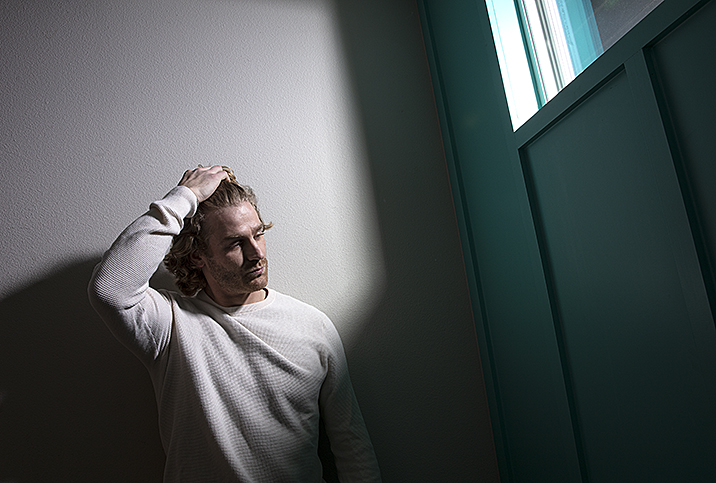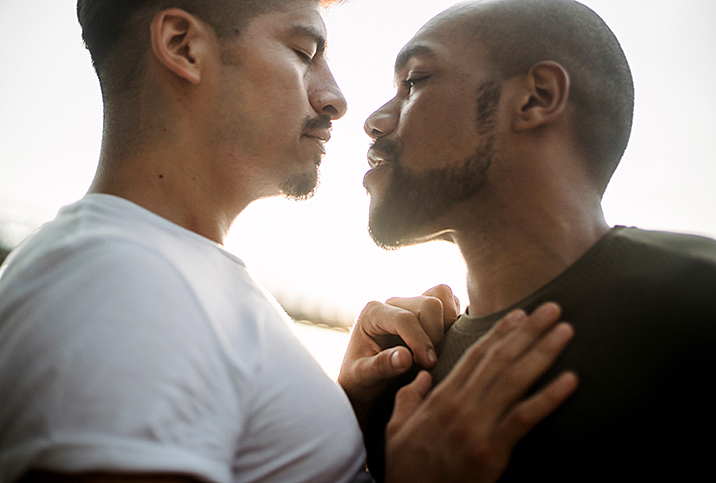How to Navigate STIs With a New Partner

Nowadays, sex moves fast. It's not so easy to get to the clinic between every new sexual partner when you're busy playing the field, nor is it pleasant to admit to someone brand-spankin' new that you could have a sexually transmitted infection (STI).
By using a simple, two-question screening process with new partners, I helped someone new I dated years ago learn they had an STI. It was jarring at first when they told me, and it was definitely a little awkward to incorporate clinical medical conversations into foreplay, but ultimately, all the open communication gave us the gift of safe, satisfying sex. And now—even though this partner and I don't have sex anymore—I still, ahem, cherish those memories we made.
Here are some suggestions on how to talk to a brand-new partner about STI testing before you go all the way.
When should you bring up STIs?
STIs can be transmitted orally and through genital contact, so it's important to be forthright and transparent about the last time either partner was tested before doing any major fooling around. For some, even the possibility of contracting herpes type 1—the kind that causes cold sores—through a heavy make-out session can feel like a violation if they've been left in the dark.
Before you start seriously necking, be prepared to talk to your new lover about any information that could have implications for their (or your) health.
Questions to ask before you do it
I've been lucky to avoid STIs during most of my dating life, but the good fortune is due in part to how I screen my partners before having sex with them.
When the mood feels right and my body signals that I want to go all the way, I ask the person I'm with two simple questions:
- When was the last time you were tested?
- What kind of protection do you have with you and/or like to use?
Of course, you don't have to make the "screening" as serious as it sounds. Feel free to use your sexy voice, and even phrase questions flirtatiously or playfully as the vibe calls for. Most likely, these two questions will open up the floor to dig a little deeper and find out other aspects of your new boo's sexual wellness routine in a friendly, organic way.
Avoid using the word "clean" when asking if your new partner has been tested (though I admit, I've done this in the past). Sex and STIs are not dirty or shameful, and phrasing a health-related question in this way can sound judgy.
It's also important to know whether people distinguish when it comes to oral sex versus sex with genital contact. Everybody has their own idea about what "protection" means. Some people willingly give and receive oral sex without requiring an STI test first since, in some cases, STI transmission rates are lower with oral sex. However, the safest bet is to know what you're working with before enjoying any kind of sexy time, since STIs can technically show up anywhere in the body where there's sexual contact.
Lastly, get on the same page about what "safe sex" means to each of you. Some people only care about birth control (that is, condoms, hormonal pills and so on), while to others, "safe sex" means preventing the transmission of STIs. Plenty of couples across sexualities and genders don't worry about unwanted pregnancies because they aren't having penetrative intercourse—but they could still benefit from an STI test.
The benefits of safe-sex pillow talk
Dating someone with herpes taught me that communication is hot. During experiences with other partners, I've felt pressure to ditch the condom or skip the health talk and go straight to getting it on. But my partner who had a chronic STI discussed every sexual step with me along the way and put my safety first. In hindsight, it was hard to wait until the results of my partner's STI test, but I'm so very glad we did (and even happier I'd remembered to ask my screening questions during our first tangle in the sheets).
Giving consent about what my partner could and couldn't do in bed was steamy. Once they started treatment to manage their herpes, I felt totally informed and safe. I felt seen and desired, fully supported in my right to make informed decisions. Having the safe-sex talk is worth every awkward, uncomfortable minute. And after all that talking, all I wanted to do was shout, "Yes!"
When you trust your partner, you both naturally lower your guard—and that most likely amplifies your desire.


















